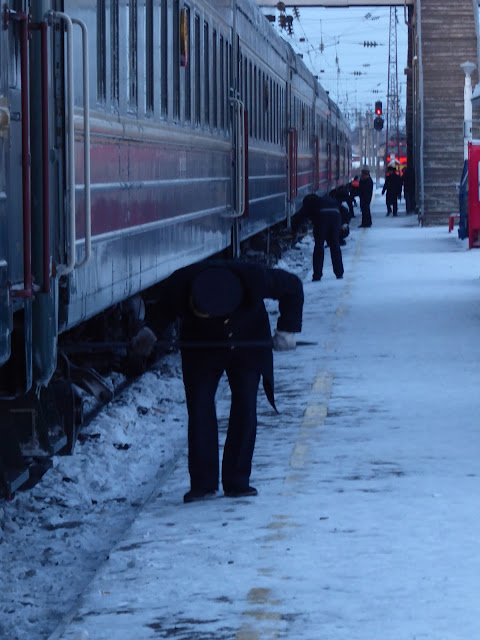Siberia
Wednesday, January 31, 2018
We've gone 2,144
km down the line from Moscow, about 1,330 miles. Brian went down to
the toilet this morning and found a giant puck of ice in the bowl.
Tyumen is the first stop in Siberia, 12 miles inside the region. It
is also the oldest Russian settlement in Siberia. Brian got off the
train to check the place out. He came back soon to report, “Yup,
it was cold.” The thermometer at the Tyumen station read -20,
that's centigrade not Fahrenheit, so that translates to about -5F,
still cold. It was about 0900 local time, and rush hour had begun as
most businesses open at 10 o' clock. We were surprised by the volume
of traffic until Brian checked his travel guide to discover Tyumen
was a city of 520,000.
 |
| Chipping Ice Off The Train |
Our attendant is
always trying to minimize the time you may be away from the train.
Ask how long the stop, it's always “Five minutes”. He's trying
to ensure no one gets left behind. At our next stop, Dwayne dashed
to the station store for some meat, cabbage pies and mineral water.
He made it back but our attendant was clearly concerned. Very few
people even get off the train; maybe, it's too cold. The little
kiosks have not been open on the platforms at most stations either.
Prices seem set by Russian Rail, and are clearly marked in the
window. A 1.5 litre bottle of water is 120 rubles, about $2.25.
Omsk had the best set up, with all the kiosks open. The babuska at
the one Brian patronized was a very happy lady who announced, “I
speak English!” Brian said, “And very well, too.” They shared
a short conversation about the cold while our car attendant stoked
the coal furnace and awaited another delivery of coal.
 |
| Taking on Coal |
We went to the
“Pectopah” car for lunch. We each had soup and a drink.
Svetlana and the cook were happy to see us – her only patrons at
the time. There was no cream of mushroom today, so three of us had
borscht with sour cream. It was tasty. Dwayne had some lamb and
vegetable soup. For an extra 10 rubles we each got a sliver of
bread, the crust trimmings from a commercial loaf like back home.
One of Russia's
best products is “Baltika” beer, which is numbered 1 through 10,
based on alcohol content. We had #7 in Moscow which is about 5.5%
alcohol. Brian picked up a #9 at Omsk which was 8.0% alcohol, A
#10 is supposed to be “rocket fuel.” Brian is keeping an eye out
for a #10.
Another oddity is
passing birch forests where all the trees appear snapped off. The
stumps range from ground level to about six feet high. One wonders
what caused the non-uniform cutting, if done by man. If the wind,
there is no residual waste in the forest as you would expect to see
after a storm. But we've passed several such forests.
As we travel
further the pine forests disappeared and only birch trees seem to
grow as we head east. There is also much less snow on the ground
which is likely due to a drier climate.
Siberia appears to
be much like northern Wisconsin with the cold, drifting snow, and
hardiness of the people. As we pass through towns along the way one
sees backyard hockey rinks with kids at play. We've seen
cross-country skier tracks. People get out despite the weather.
Villages are cute, many houses are small log cabins, with the
chimneys spouting white wood smoke from the stoves keeping these
homes warm.
 |
| Siberian Village |
Tonight the heat
in our car started to falter. Seems we've run out of coal to keep it
fired. The attendant has pulled all the shades attempting to
conserve heat. Hopefully the next stop will bring some relief. At
least the samovar is cooking along – allowed us to make some
dehydrated chicken and rice. And we have a bottle of Stolichnaya
vodka to help keep us warm. It was half gone before we turned in for
the night.
We closed out the
day with a stop in Novosibirsk, where it was -12C, about 5F. It is
the third largest city is Russia. A few folks got on the train. Our
next “big” stop is at Mariinsk (yes, “double i”), where we
apparently change locomotives again. I think our attendant borrowed
some coal – heat is back on, but nowhere near the stifling
temperatures we've occasionally endured.
No comments :
Post a Comment
Leave A Comment...